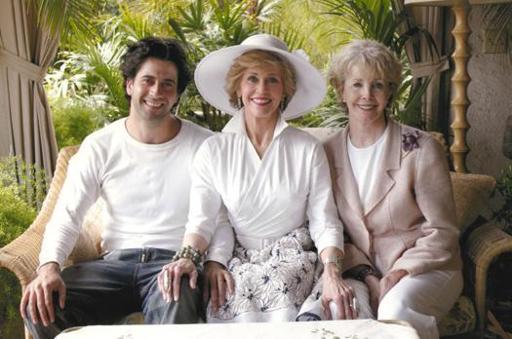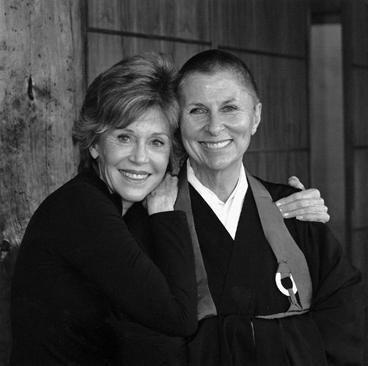Prime Time (23 page)
Authors: Jane Fonda
Tags: #Aging, #Gerontology, #Motion Picture Actors and Actresses - United States, #Social Science, #Rejuvenation, #Aging - Prevention, #Aging - Psychological Aspects, #Motion Picture Actors and Actresses, #General, #Personal Memoirs, #Jane - Health, #Self-Help, #Biography & Autobiography, #Personal Growth, #Fonda

Laughing with my friend Robin Morgan in 2004. She was interviewing me for
Ms.
magazine.
PHOTO COURTESY OF HAROLD DANIELS
Troy, me, and Shirlee on the set of
Monster-in-Law.
Dr. Ken Matheny, Regents Professor in Georgia State University’s Department of Counseling and Psychological Services, which he founded in 1966, told me that one of the premier sources of information about centenarians in the country is the Institute of Gerontology, at the University of Georgia in Athens. “There are now about fifty-six thousand Americans who are centenarians,” he said, “and when they study these folks, they find that on the whole they report more happiness than the average person. Which is startling, isn’t it?”
Come to think of it, the oldest people I have interviewed for this book have one striking thing in common: a sense of humor. For instance, ninety-five-year-old Karl. When I asked him for his age, he said, “I don’t know how old I am, but I was around when the Dead Sea was only sick.” When 104-year-old Cal Evans was asked by a Denver reporter, “Have you lived in Denver all your life?” Cal laughed and answered, “Not yet, sonny.” And there was Jeanne Louise Calment of Arles, France, the longest-lived person on record. Born in 1875, she died at 122 years and four months. She is reported to have quipped at age 119, “I have only one wrinkle, and I am sitting on it.” At one of Jeanne’s last birthday parties, in Paris, a journalist said with great hesitancy in his voice, “Well, I guess I will see you next year,” to which she responded, “I don’t see why not; you look to be in pretty good health to me.”
The Zen priest Joan Halifax and I were discussing the various ways in which our bodies are starting to weaken. “Yes,” she said at age sixty-five, “on some level, certain aspects of my life are shrinking. But as they shrink, something else expands, and there seems to be this compensation.”
“Give me an example,” I said.
“Well, my sense of humor has expanded. My robustness has expanded. My tolerance and patience have expanded. My love of people and of my work and of the earth has expanded. Younger people tend to get more obsessed over little details,” Joan explained, “whereas older people tend to just find out what is important.”
At the Upaya Zen Center with Roshi Joan Halifax.
TERI THOMSON RANDALL
Roshi Joan Halifax, me, and Mary Catharine Bateson.
“They don’t sweat the small stuff,” I said.
“That’s right. And on the other side of the equation, I think aging has stripped away a lot of my fear.”
I had heard the same thing from the writer Erica Jong. “I am much more relaxed now,” Erica told me over lunch in her art-filled New York apartment. “I am much less uptight. I know that things are not personal. If somebody criticizes something I have written, if somebody says something vicious about me, I think it is funny and I think it’s about them, not about me. I hadn’t gotten there earlier. After
Fear of Flying
I nearly dried up and stopped writing because the attacks were so vicious.”
At a breakfast meeting in Ann Arbor, Michigan, I told Dr. Marion Perlmutter about my own growing sense of peace and detachment. “I hate to even use that word, ‘detachment,’ ” I said, “because it can be interpreted as noncaring when, in fact, I do care about most things just as much as ever.”
Dr. Perlmutter, who is with the Department of Psychology at the the University of Michigan, answered me: “I understand. As a scientist, I not only know more things about the brain, but I appreciate more all of the things I
do not know.
It is that, perhaps, the appreciation of the limitations of our knowledge, that has us detach a little bit and maybe moves us to something spiritual. Knowing what you don’t know is the first stage of knowing. But I think that only in late life does that part of understanding kick in. And this, I think, helps us detach.”
Dr. George Vaillant, director of the Harvard Study of Adult Development, discovered that older people develop “mature defenses.” By this he means the ability to turn lemons into lemonade and to not turn molehills into mountains.
2
Dr. Laura Carstensen, founding director of the Stanford Center on Longevity, says that while there are some older people who don’t show a “Positivity effect” at all, and some younger people who do, generally Positivity represents an important developmental shift, a way to approach life that is expressed through humor, gratitude, forgiveness, playfulness, creativeness, and flexibility. “Goals change as people age,” she told me. “There are so many what-ifs in the lives of younger people, whereas we are armed with a long backward look—‘this has happened before.’ ”
Dr. Perlmutter agrees that Positivity may be due to “the accumulation of perspective. The first time that something happens, like financial loss, for instance, it is horrible. But after you have seen cycles of something like that happening, you have some perspective that this doesn’t mean the end of life. It just means a new challenge that we will get through.” All of these psychologists seem to agree that the “this too shall pass” view of life is a hard one for young people—and many in midlife as well—to fully accept; less so, for folks in Act III.
During a meeting in Atlanta, Dr. Matheny told me, “Life has shown you that you survived before, you’ll survive again. And since you now are no longer competing like you were earlier, there is not as much hypervigilance, there are more acceptances, letting things develop. You can’t possibly oppose every force that comes up, every little problem that you’ve got, and so learning to accept and, I think, accommodate and adjust is every bit as important as mastery because you can’t master that many things. So it is like martial arts—if the force comes, you don’t oppose it, you just try to guide it. And I think there is something of that that happens with age.”
Dr. Carstensen concurs. “Elders tend to know what they want and need to make their lives richer and deeper, and they are able to discard what they no longer need,” she told me.
We are less apt to be thrown by outside events. When people are very young they have long and nebulous futures ahead of them and all sorts of information might be useful even though it might not be useful immediately. It is very informative to know where the tiger is hiding in the brush. But once you know that, you don’t have to keep going back to visit the brush. You don’t need to spend so much time preparing, you just know. So as the future becomes shorter, you know what information is relevant to your goals and what isn’t because your goals are clearer; you know what you are focused on; you know what is important and what is not; you can separate the wheat from the chaff, so to speak. What is relevant to your goals you will learn quickly and you’ll let the rest go. I’ve spent the last thirty years investigating the psychology of aging and my research consistently shows that, in terms of emotions, the best years come late in life.… Older people as a group suffer less from depression, anxiety, and substance abuse than their younger counterparts. In everyday life, they experience fewer negative emotions but just as many positive ones as people in their twenties and thirties—the people we stereotypically think of as the most happy.
3
Carstensen also notes that seniors are less apt to bear grudges and that they pick their fights carefully, which is why we make good mediators and facilitators.
Many psychologists have identified the Positivity of aging. According to John Gabrieli, a professor of cognitive neuroscience at the Massachusetts Institute of Technology, “As people get older, they seem to be willing to accept things that, when we’re young, we would find disturbing and vexing.” Betrayal, for instance, is so hard to accept when we are young. But Dr. Gabrieli believes that seniors may be more able to see things from the other person’s perspective and thus don’t view certain actions as betrayal. He says, “It paves the way for you to be sympathetic to the situation from his perspective, to be less disturbed from her perspective.” He calls this “compassionate detachment,” which doesn’t mean not caring or that we’ve become bankrupt of certitudes. It means having no personal agenda, no ego stake in outcomes. This means that with age, we can be more trustworthy—it’s easier for us to see all sides and give advice that comes more from our heart than from our ego.
As I learned about the Positivity that seems to come with age, it began to feel more and more like wisdom. Experts on such things have never quite come to an agreement on what constitutes wisdom or whether we get wiser with age, but the descriptions of it that resonate with me include:
- The ability to step outside oneself and assess troublesome situations with calm reflection.
- The ability to regulate our emotions.
- Knowing what is nonessential and letting it go. The philosopher and psychologist William James observed, “The art of being wise is the art of knowing what to overlook.”
- The willingness to embrace uncertainty.
Though I know young people who demonstrate some or all of these qualities, I cannot help but feel that these are attributes that tend to come to the fore as we age and gain experience. Mary Catherine Bateson says, “Experience doesn’t make people wise. It is reflection on experience that makes us wise.” Many of us don’t take time to reflect until age provides us the time to do it. Doing a life review forces us to reflect on our experiences; thus, I believe, it can help lead us to wisdom.
I asked Dr. Matheny why he thought some seniors can adjust and adapt to the challenges of age with humor when others can’t. Is it possible, I asked, to get better at that if it hasn’t been your character style?
“Look, an awful lot of people suffer terribly in old age, so I’m not judging anybody,” he replied. “I am sure that being positive is not all just a matter of willpower. In other words, there is a whole history of conditioning experiences people have—in childhood and throughout their entire lives. So it’d be cruel to say that you should just be able to be positive. But I think this is where you want to get to if you can, and apparently a lot of centenarians have.”



